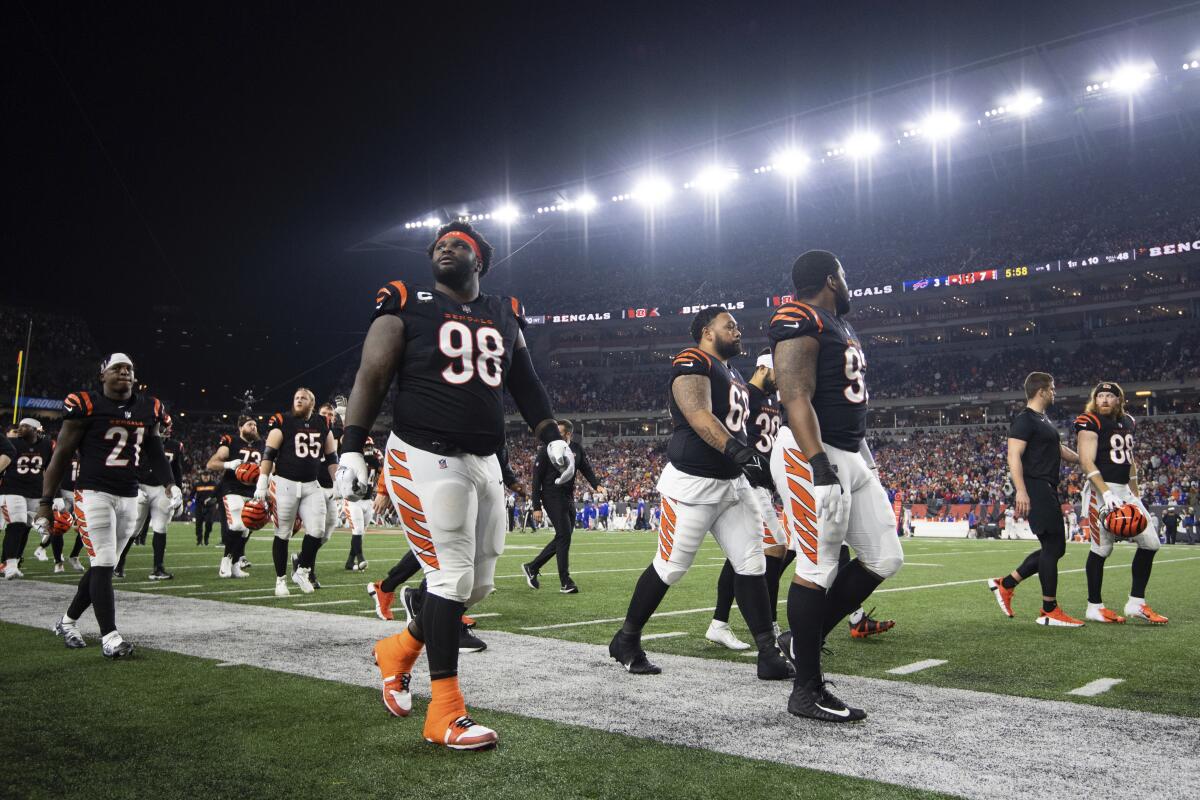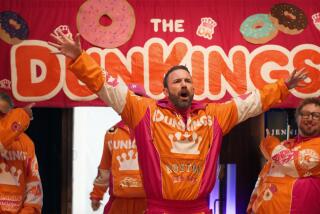This time, after a tragedy on the field, the NFL gave players time to be in shock

- Share via
It was cloudy in Detroit the day Chuck Hughes died. It was Oct. 24, 1971, and the Lions were hosting the Chicago Bears at Tiger Stadium. Hughes, a wide receiver for the home team, was making his way back to the huddle when he collapsed face-down, his arms motionless by his side. The Bears’ Dick Butkus waved frantically toward the benches for help. One doctor administered mouth-to-mouth, another pounded Hughes’ chest. It was later reported that he died of a heart attack caused by a blood clot, becoming the first and only NFL player to die on the field. He was 28 years old.
Like many football fans, I had not heard Hughes’ story until Buffalo Bills safety Damar Hamlin collapsed on the field in Cincinnati during the first quarter of Monday night’s game. Like Hughes’, Hamlin’s heart had stopped beating. Hamlin received CPR. By Tuesday afternoon, he was still sedated and in critical condition.
Opinion Columnist
LZ Granderson
LZ Granderson writes about culture, politics, sports and navigating life in America.
Monday night’s game was postponed. Unfortunately that did not happen in 1971.
That game not only resumed play — despite players being “visibly distraught” — but was even televised. The players did media interviews afterward. Butkus was quoted as saying, “the winning was spoiled.” One news story reported players “wept without shame,” a reflection of a society not yet accustomed to seeing men be human, let alone gods be mortal.
Thankfully we’re not that kind of place anymore.
We’re still a whole lot of other things. But at least we stopped being the kind of country that just resumes play.
Somewhere between the initial five-minute break that was reportedly given to players to regroup and the official statement of postponement from the NFL, the call to let these athletes be human grew louder than the momentum toward resuming. It’s progress.
Eastside Golf series Grails shows golf clothing is key to diversity in the sport
A different decision was made 50 years ago. Why is not clear. Maybe it was because there were only 62 seconds of play remaining. Maybe it was because we had become culturally desensitized to loss in general because of the accumulated toll of the Vietnam War. Or perhaps resuming the game was just an extension of what it meant to be a man in those times. The top movies in 1971 included James Bond and introduced us to Dirty Harry and Shaft. The following year we met the Godfather. Four iconic characters renowned for their superhuman invulnerability and emotional detachment. That was the model of men at that cultural moment.
Maybe players and coaches did not want to resume the game after Hughes died on the field, but they did not know how to say that.
Money, as always, was probably a factor. At the time, the team with the highest average salary was the Baltimore Colts at $31,300. The average quarterback made less than $40,000, and that was the highest-paid position. That’s still significantly higher than 1971’s median family income of $10,290, but players were hardly set for life, because the contracts were not guaranteed.
In addition, when the players went on strike the year before, owners threatened to cancel the season. During negotiations, owners actually requested that the players stop asking for a raise, which prompted the union to become certified with the National Labor Relations Board. Given that dynamic, not many players in 1971 would risk their career by not finishing the game if told to do so.
Stealing welfare funds would be new low.
And then given the expectations of what it meant to be both a man and a professional athlete, what would have possibly been an acceptable reason to postpone play? The NFL didn’t even officially start studying concussions until 1994. Hard to imagine players in the 1970s wanting to have a conversation about mental health, even after witnessing the death of a teammate.
It must have been an impossible situation.
One that was avoided Monday, 90 minutes after kickoff.
That’s how long it took for the biggest game of the season to morph into a frightening reminder of how dangerous the game of football is, and just how fragile we all really are. Sadly, few cities have been reminded of that fragility as publicly as Buffalo over the past seven months: 10 people died in a mass shooting at a supermarket last May; 39 in the area in December’s horrific winter storm; and now….
“What was most important was that it wasn’t about proceeding with the game,” said Troy Vincent, the league’s executive vice president of football operations. He is also a former player, defense like Hamlin, who once played for the Bills. “Frankly, that aspect never crossed my mind.”
A position that is less controversial today because society is learning being superhuman does not mean you’re inhuman. On a cloudy night in Ohio, the NFL was again faced with the unthinkable. It’s a positive sign that this time around, society did not expect the players to be unfeeling.
More to Read
A cure for the common opinion
Get thought-provoking perspectives with our weekly newsletter.
You may occasionally receive promotional content from the Los Angeles Times.













